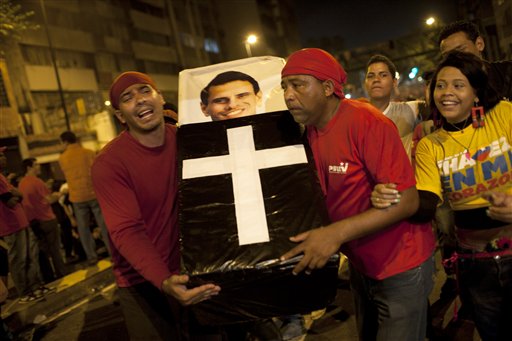(AP) Chavez wins 3rd re-election in tightest race yet
By FRANK BAJAK and IAN JAMES
Associated Press
CARACAS, Venezuela
President Hugo Chavez put to rest any doubts about his masterful political touch in winning a third consecutive six-year term after a bitterly fought race against a youthful rival who has galvanized Venezuela’s opposition.
The state governor who lost Sunday’s presidential vote, Henrique Capriles, had accused the flamboyant incumbent of unfairly leveraging to his advantage Venezuela’s oil wealth to finance his campaign as well as flaunting his near total control of state institutions.
Capriles also narrowed Chavez’s margin of victory to his smallest yet in a presidential contest. This time, the former army paratroop commander who led a failed 1992 coup won 55 percent of the vote against 45 percent for Capriles, with 98 percent of the vote counted.
In 2006, Chavez’s margin of victory was 27 points.
Nevertheless, the populace endorsed once again Chavez’s stated aim of converting Venezuela into a socialist state.
Capriles said in his concession speech that he rejects the idea of two Venezuelas divided by ideology and class.
Capriles had vowed to seriously address violent crime that has spun out of control, streamline a patronage-bloated bureaucracy and end rampant corruption, but his promises proved inadequate against Chavez’s charisma, well-oiled political machine and legacy of putting Venezuela’s poor first with generous social welfare programs.
Yet Chavez only got 551,902 more votes this time around than he did six years ago, while the opposition boosted its tally by 2.09 million. Chavez appeared to acknowledge the opposition’s growing clout.
Tensions were high Sunday night as announcement of the results were delayed.
Finally, fireworks exploded over downtown Caracas amid a cacophony of horn-honking by elated Chavez supporters waving flags and jumping for joy outside the presidential palace.
Chavez will now have a freer hand to push for an even bigger state role in the economy, as he pledged during the campaign, and to continue populist programs. He’s also likely to further limit dissent and deepen friendships with U.S. rivals.
A Capriles victory would have brought a radical foreign policy shift including a halt to preferential oil deals with allies such as Cuba, along with a loosening of state economic controls and an increase in private investment.
President Raul Castro of Cuba, which could have been badly hurt by a Chavez loss, was among Latin American leaders sending warm congratulations to the former paratrooper on his victory after nearly 14 years in office.
He ran through crowds of Chavez supporters packing the streets around the presidential palace wearing a Venezuelan flag as a cape and yelling: “Oh, no! Chavez won’t go!”
Voter turnout was an impressive 81 percent, compared to 75 percent in 2006. Chavez paid close attention to his military-like get-out-the-vote organization at the grass roots, stressing its importance at campaign rallies. The opposition said he unfairly plowed millions in state funds into the effort.
Chavez spent heavily in the months before the vote, building public housing and bankrolling expanded social programs.
But Shifter also didn’t deny the affinity and gratefulness Venezuela’s poor feel for Chavez. “Despite his illness, I still think he retains a strong emotional connection with a lot of Venezuelans that I think were not prepared to vote against him.”
Chavez spoke little during the campaign about his fight with cancer, which since June 2011 has included surgery to remove tumors from his pelvic region as well as chemotherapy and radiation treatment. He has said his most recent tests showed no sign of illness.
Capriles told supporters not to feel defeated.
Despite winning a February primary that unified the opposition, Capriles was unable to sufficiently erode Chavez’s firm base of loyal support.
One pro-Chavez voter, private bodyguard Carlos Julio Silva, said that whatever his faults, Chavez deserved to win for spreading the nation’s oil wealth to the poor with free medical care, public housing and other government programs. The country has the world’s largest proven oil reserves.
At many polling places, voters began lining up hours before polls opened at dawn, some snaking for blocks in the baking Caribbean sun. Some shaded themselves with umbrellas. Vendors grilled meat and some people drank beer.
Chavez’s critics accused the president of inflaming divisions by labeling his opponents “fascists,” “Yankees” and “neo-Nazis,” and it’s likely hard for many of his opponents to stomach another six years of the loquacious and conflictive leader.
Some said before the vote that they’d consider leaving the country if Chavez won.
Gino Caso, an auto mechanic, said Chavez is power-hungry and out of touch with problems such as crime. He said his son had been robbed, as had neighboring shops.
___
Associated Press writers Fabiola Sanchez, Christopher Toothaker, Jorge Rueda and Vivian Sequera contributed to this report.
___
Ian James on Twitter: http://twitter.com/ianjamesap
Frank Bajak on Twitter: http://twitter.com/fbajak

COMMENTS
Please let us know if you're having issues with commenting.